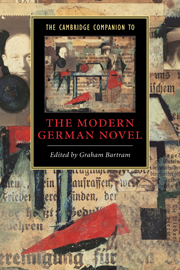Book contents
- Frontmatter
- 1 The German novel in the long twentieth century
- 2 Contexts of the novel
- 3 The novel in Wilhelmine Germany
- 4 Gender anxiety and the shaping of the self in some modernist writers
- 5 Franz Kafka
- 6 Modernism and the Bildungsroman
- 7 Apocalypse and utopia in the Austrian novel of the 1930s
- 8 Images of the city
- 9 Women writers in the ‘Golden’ Twenties
- 10 The First World War and its aftermath in the German novel
- 11 The German novel during the Third Reich
- 12 History, memory, fiction after the Second World War
- 13 Aesthetics and resistance
- 14 The kleiner Mann and modern times
- 15 The ‘critical’ novel in the GDR
- 16 Identity and authenticity in Swiss and Austrian novels of the postwar era
- 17 Subjectivity and women’s writing of the 1970s and early 1980s
- 18 The postmodern German novel
- Index
- Series List
15 - The ‘critical’ novel in the GDR
Published online by Cambridge University Press: 28 May 2006
- Frontmatter
- 1 The German novel in the long twentieth century
- 2 Contexts of the novel
- 3 The novel in Wilhelmine Germany
- 4 Gender anxiety and the shaping of the self in some modernist writers
- 5 Franz Kafka
- 6 Modernism and the Bildungsroman
- 7 Apocalypse and utopia in the Austrian novel of the 1930s
- 8 Images of the city
- 9 Women writers in the ‘Golden’ Twenties
- 10 The First World War and its aftermath in the German novel
- 11 The German novel during the Third Reich
- 12 History, memory, fiction after the Second World War
- 13 Aesthetics and resistance
- 14 The kleiner Mann and modern times
- 15 The ‘critical’ novel in the GDR
- 16 Identity and authenticity in Swiss and Austrian novels of the postwar era
- 17 Subjectivity and women’s writing of the 1970s and early 1980s
- 18 The postmodern German novel
- Index
- Series List
Summary
For many who watched them, the dramatic events that unfolded in the German Democratic Republic in the autumn of 1989 - the so-called Wende or 'turning-point' - seemed to confirm what Christa Wolf had asserted two decades earlier: 'The writer . . . is an important person.' As one of the most acclaimed writers in the German Democratic Republic, Wolf's own importance was primarily an effect of the attention accorded to her as a critical voice by readers inside and outside the GDR - as well as by that state itself. For almost as long as the GDR existed, texts by Wolf and other critical writers were scrutinised on both sides of the East/West German border in order to discover how the writers' mastery of language was deployed in broaching taboo topics, expressing opinions contrary to the officially promulgated party line, or questioning the official code of form and content embodied in the notion of 'socialist realism'. For the purposes of this discussion, 'critical' novels are understood to be works written in the GDR, usually by convinced Marxists, who nonetheless distanced themselves from the rhetoric and expectations of those in power. This element of resistance can be located both in nonconformity to the party line in matters of content, such as pressure to depict 'positive socialist heroes', but also in regard to preferred aesthetic strategies.
- Type
- Chapter
- Information
- The Cambridge Companion to the Modern German Novel , pp. 218 - 231Publisher: Cambridge University PressPrint publication year: 2004

